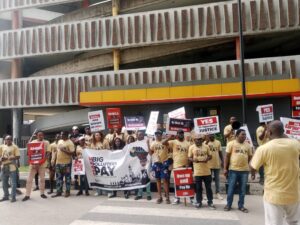Representatives of communities in the Niger Delta and groups of environmental activists have protested against Shell’s plan to divest from Nigeria, insisting that the multinational oil giant should clean up the mess its activities caused in Ogoniland and other parts of the oil-rich Niger Delta region before it sells its onshore assets to local firms.
During the protest at Shell’s Head Office in Marina, Lagos Island, the communities and groups also decried Chevron Nigeria Limited (CNL) expansion drive, maintaining that Shell, Chevron and their oil and gas counterparts in the country should clean up the polluted environments in which there been operating for decades.
Maintaining that the International Oil Companies (IOCs) and their government collaborators are more interested in profits to the detriment of the people, they cautioned that Chevron should not even think of expanding its operations in Nigeria in the face of excruciating impacts of climate change, but rather evolve ways of reducing carbon emissions in the environment.
The rally, organized by the Corporate Accountability and Public Participation Africa (CAPPA) and the Health of Mother Earth Foundation (HOMEF) under the aegis of the Make Big Polluters Pay Action and as part of the Global Anti-Chevron Day of Action, coincided with Shell Annual Shareholders Meeting (AGM) at InterContinental London-The O2, 1 Waterview Drive, Greenwich Peninsula in London, United Kingdom.
In their resolution, CAPPA and HOMEF said while the management of Shell, its Chairman, Board members, directors and stakeholders convene in the United Kingdom for its AGM, we gather here in front of its Lagos Head Office in Nigeria to re-state our longstanding grievances.
“Indeed, Shell’s shareholders would rather choose the comfort of the Intercontinental London Hotel to review their deceitful and environmental devastation strategies without any regard for the dignity and sanity of people who are at the receiving end of their hazardous operations. They would rather the cozy ambience of artificial nature than care about the growing impact and problems their reckless oil extraction inflicts upon vulnerable communities in Africa and elsewhere.
“In Nigeria, the absurdity reaches new heights as Shell sets to divest its onshore business and offload its toxic assets to Renaissance – a consortium of five companies, including four local exploration and production entities and an international energy group.
“This polluting corporation, after decades of mindless operations in the country’s Niger Delta region, is about to flee from its atrocities, leaving behind a wake of destruction – of farmlands and water bodies now contaminated with huge deposits of petroleum and of poor communities, livelihoods, and public health wrecked by years of its merciless extractive onslaught,” their statement reads.
They lamented that to make matters worse, Shell’s plan to sell its onshore assets is a further act of mischief, especially considering that the new buyers are companies with shadowy backgrounds and limited capacity to manage the corporation’s extensive liabilities.
Maintaining that Shell allegedly intends to provide loans to the buyers to help them purchase the same assets, they said “the shameless ploy to offload liabilities while continuing to profit from the transaction reveals the depth of Shell’s exploitation and the lengths it will go to maintain its stranglehold on Nigeria’s resources while evading accountability.”
 In the communiqué signed by Executive Director of HOMEF, Dr, Nnimmo Bassey and his CAPPA counterpart, Oluwafemi Akinbode, they urged the Nigerian government must act responsibly and in accordance with extant exit measures and processes to address the lingering questions around the environmental audit of the corporation’s infractions.
In the communiqué signed by Executive Director of HOMEF, Dr, Nnimmo Bassey and his CAPPA counterpart, Oluwafemi Akinbode, they urged the Nigerian government must act responsibly and in accordance with extant exit measures and processes to address the lingering questions around the environmental audit of the corporation’s infractions.
Read also: CAPPA decries Lagos Water Corporation’s propaganda against sacked workers
They also demanded compensation plans for affected citizens of the Niger Delta, whose lives have been irreversibly impacted by Shell’s extractivism and the terms and conditions of divestment, adding that this should include coercing Shell to decommission its old and toxic infrastructure across the country.
“Shell’s divestment from Nigeria does not absolve it of responsibility and being held accountable. The company must address the environmental destruction, human rights abuses, and social injustices it perpetrated.
“Before its departure, Shell must commit to implementing the reclamation measures recommended by independent environmental audits and pay adequate compensation to those who have borne the brunt of its profit-driven operations,” they added.
They, therefore, demanded an independent and comprehensive assessment of the entire Niger Delta environment; an open and comprehensive health audit of people living in extractive communities across the Niger Delta, as well as a thorough cleanup, remediation and restoration of all polluted and contaminated areas linked to Shell’s exploration activities.
Others demands are that Shell, Chevron and other oil companies should be held accountable for the destruction of Niger Delta communities; that divestment and (or) expansion plans follow due process of decommissioning; that the Nigerian government’s environmental and climate change policies be devoid of bloated corporate language, including false solutions such as Net Zero and that host communities should be recognized as major stakeholders that must be accorded expression on matters that concern their safety and survival.






